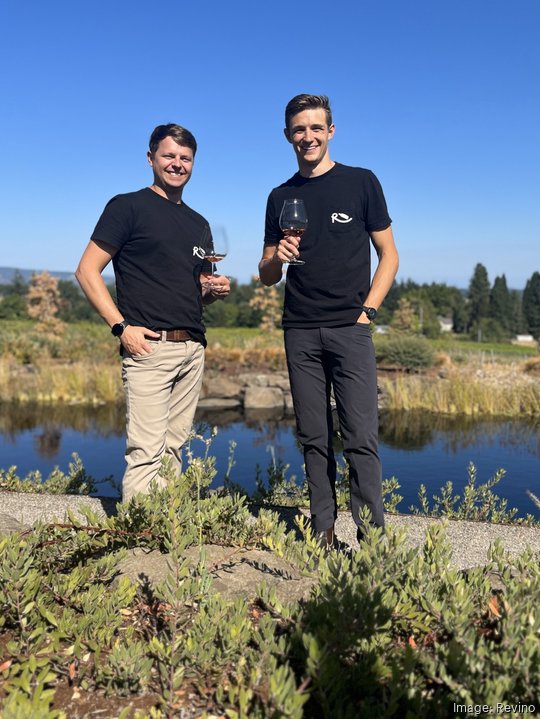
A new path to sustainability could be opening for wine bottles, the abandoned stepchild of Oregon's wildly successful Bottle Bill.
In a twist, though, it's refilling and reusing bottles, not recycling them, that's in the works.
A Newberg startup called Revino has been laying the groundwork for a refillable bottle program for a couple of years. Founders Keenan O'Hern and Adam Rack have met with wineries around Oregon, bottle-handling equipment makers in Europe where reuse is more common, label experts, and bottle suppliers.
Hurdles remain for the venture, but signs of progress abound. The company has landed on a bottle design and some 40 wineries are committed to the program. The Oregon Beverage Recycling Cooperative, which operates the Bottle Bill, is set to work with Revino on returning used bottles.
The hope is to put 2.4 million bottles into circulation next year.
Revino needs to raise money to buy equipment and pay for other operational needs — it recently launched a seed round of unspecified size — but green-minded wineries are impressed with what they've seen from the company.
"Refillable bottles are something that's been talked about every five or 10 years for the past 30 years," Pat Dudley, president and general manager at Bethel Heights Vineyard northwest of Salem, said. "There were always obstacles. But now Revino came along and it was one of those moments where you said, 'Aha.'"
The founders
O'Hern, Revino's CEO, is a George Fox MBA with a consulting background. Emerging from business school, he felt drawn to a venture focused on reuse, and mulled different product possibilities.
"I'd seen bottles on the side of the road, strewn about, and then went back to my recycling bin and thought, 'Where's this going?'" he said.
Wine bottles were left out of the Bottle Bill in 1971 — a time when Oregon's wine industry was in its infancy — on the justification that they weren't a significant source of litter (cleaning up roadsides was a big impetus for the legislation). Industry trepidation has since kept them out.
A lot of wine bottles are collected and recycled through local pickup programs, but not all are and "you still have millions going into landfills," O'Hern said. Revino cites a study out of Europe that found reusable glass has 85% less greenhouse gas emissions than single-use glass.
Rack, the co-founder, spent eight years at Coopers Hall, including as operations manager. While he was there, the Portland winery joined an OBRC refillable program for 500-milliliter bottles begun in 2018. That program, used also by cider and beer makers, has about 2.8 bottles in circulation, according to Eric Chambers, vice president of strategy and outreach at OBRC.
Revino sees much larger potential with the classic 750-milliliter bottle size that it's focused on. In 2021, Oregon wineries sold some 2 million cases of wine in the state — 24 million bottles.
Revino will offer a 10-cent credit to wineries that return bottles. Consumers will also be able to return bottles through OBRC's Bottle Drop network and receive a 10-cent "return value" — technically, not a deposit, since these refillables aren't part of the Bottle Bill. Revino will cover that payment and pay a participation fee to OBRC.
More reuse, more revenue
"We earn revenue of the first sale of the bottle … so once we hit that second use, we're already starting to see a large (revenue) return on each of those bottles," O'Hern said. At three uses, the bottles break even on carbon emissions.
"If we can get the 50 uses like Germany and other countries are getting out of these bottles, and you multiply that over millions of bottles that we sell every year, that starts to grow pretty quickly," he said.
Wineries, of course, will want to use the bottles for wines that are sold in Oregon and have the potential to be returned. Bethel is starting small, planning to use the bottles for a 500-bottle run of a high-end club-only offering, Dudley said.
She doesn't think it's guaranteed that Revino can conquer the challenges it faces — not just raising capital, but implementing the full process of collecting the bottles, removing the labels, washing the bottles, etc. But their diligence so far — and a crying need for change — leave her optimistic and urging fellow wineries to support the effort.
"Everyone in the industry knows that things have to change when it comes to packaging," she said. "One thing to recognize is that if we do make it work, it’s a real coup for the Oregon wine industry, a public relations dream come true."
Her own view is that the Revino's odds of success would increase dramatically if wine bottles become a formal part of the Bottle Bill. Bottles that are in the program were returned at an 85.5% rate last year, making it the best-performing redemption program in the nation by far.
California appears to be moving to make wine bottles part of its redemption program. The Oregon industry, facing a new Oregon requirement to address its packaging waste beginning in 2025, is now contemplating asking for inclusion in the Bottle Bill.
Revino is "trying to be agnostic" on that question, O'Hern said.
"We want to be part of whatever system gets established," O'Hern said. "Our focus now is making this work independent of the Bottle Bill."



